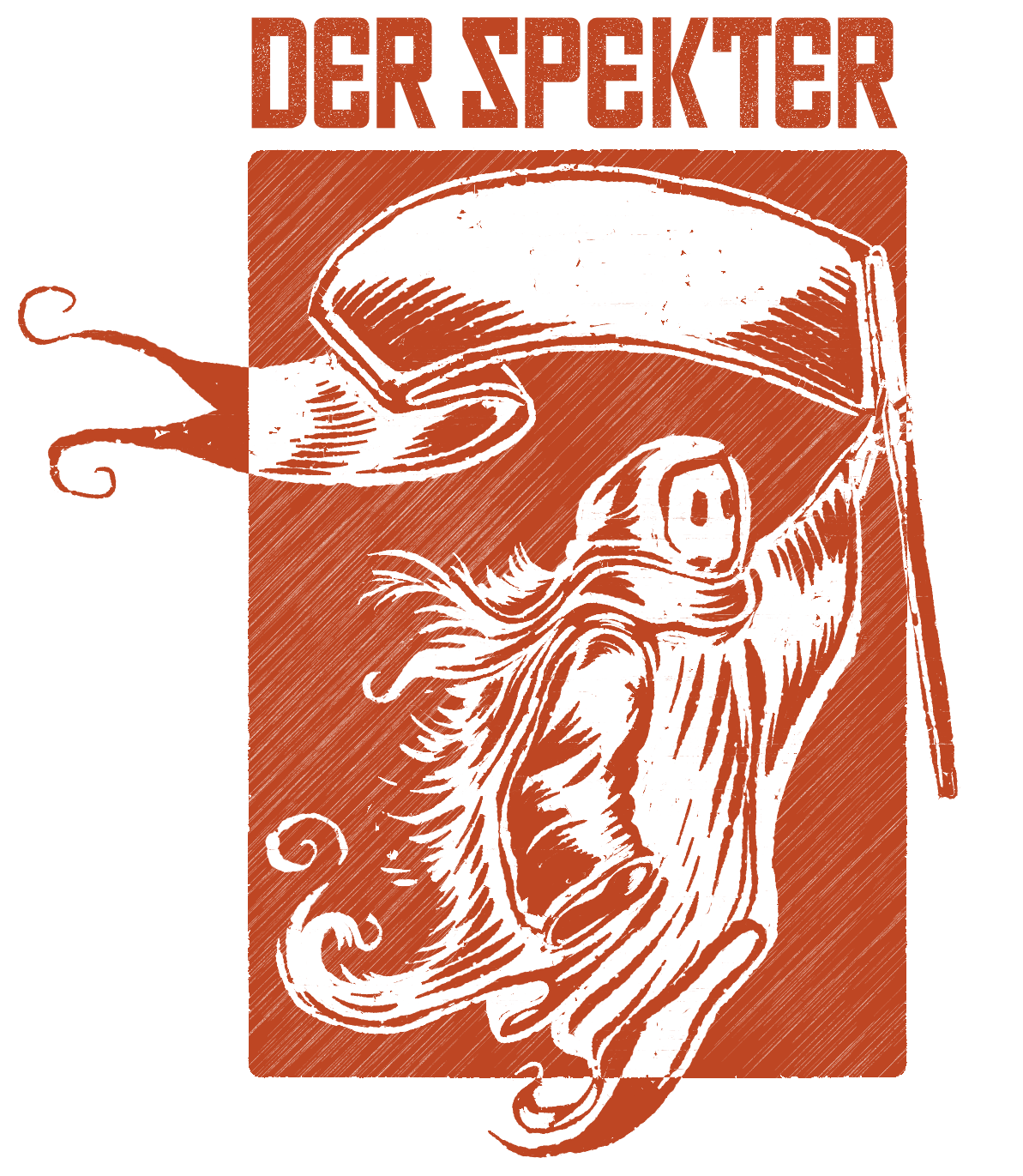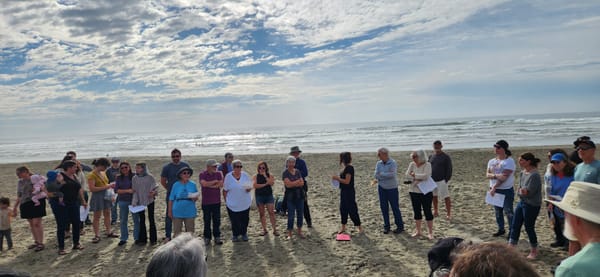A Very Bundist Passover
What it means to celebrate Passover as a Bundist, and resources for a year unlike all other years.
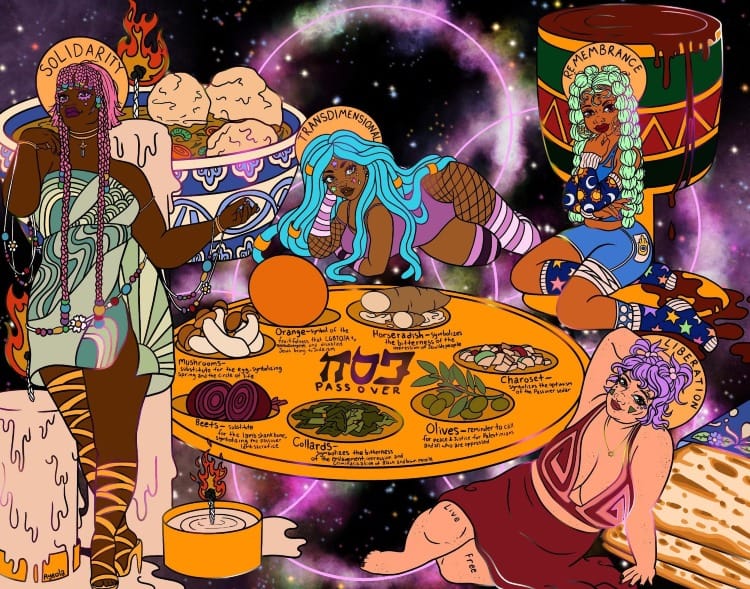
As we approach another holiday on the Jewish calendar, Zionists again are loudly making the claim that our hundreds-of-years-old traditions are Zionist. It happens every year, although this year, as Israel continues to wage its genocidal war against Gaza, those voices seem louder than ever.
The creation of the state of Israel urged a reimagining of Hanukkah that lionizes the brief military victory by the masculine Maccabees, in spite of the fact that sacred texts hardly mention the battle. The question of whether anti- and non-Zionist Jews can or should celebrate Hanukkah entered the discourse then, as is happening now with Passover. Those with a narrow reading of the tradition, like journalist Eve Barlow, might apply Zionist readings of the Jews’ freedom from slavery in Egypt to the the modern nation-state of Israel.
“You cannot do an anti-Zionist Passover seder,” she claims. “Passover is a Zionist festival, about Jewish people emancipating themselves from slavery in the land of Egypt and arriving in the land of……… Israel!”
The Bundists of yore applied their own socialist, anti-Zionist, secular reading to Passover—a holiday that, despite the Haggadah's clarion call of "next year in Jerusalem!" is ultimately about freedom and liberation. Bundists' rejection of religion did not mean that religious individuals were not accepted by the Jewish Labor Bund, as it fought for equal rights for all, regardless of nation or religion (contemporary Bundists are incredibly diverse; while some members of Der Spekter’s editorial board will celebrate with lefty Seders, others do not celebrate at all). Nor did it mean that all Jewish traditions were rejected. Festivals became a practice of Jewish culture rather than religion, and traditions were adapted and radicalized along the way.
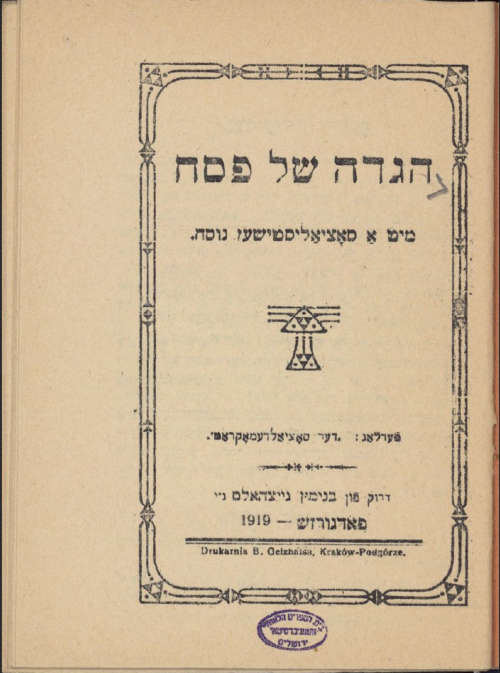
Interpretations of Passover, though, did not come without challenges. As Daniel Mahla writes, Jewish socialists “found themselves striving to reconcile different and sometimes clashing concepts, namely, the universalist notion of an international working class...as opposed to the particularistic notion, stressed in the traditional Passover [haggadah], of the Jews as a unique and even chosen people.”
Hence, Bundists, in creating their own secular holiday culture, revised the Passover narrative to strip it of its attachment to religion and a single place and fill it with class-conscious meaning. They created their own Yiddish-language materials for a celebration that reflected universal freedom—a message at the heart of Passover that subsequent generations of Jews of many types now center in their celebrations. For example, the Bundist Haggadah refashions a controversial line in the original text (“Pour out Your wrath upon the nations that do not acknowledge You”) by replacing the word “wrath” with “heat” or “warmth.” “Instead of being destroyed by God’s consuming anger,” Mahla writes, “those nations that have not (yet) acknowledged the new social order will bask in the warmth of socialism.”
Every year, we think not just of our own exodus from freedom but also of those who are not yet free, and how all of our fates are intertwined. This year, in particular, we think of Palestine. As we invite all who are hungry to our Seder tables, we remember that millions are at risk of starvation in Gaza, and millions more in the West Bank are facing pogroms by settlers backed by the Israeli state. We remain horrified by these developments, but inspired by the resilience of the Palestinian people and committed to a just world for all. At our Seder tables, let us say, next year in freedom!
Below, the editors of Der Spekter share some resources we hope will supplement your Passover, however (or if) you observe. These include contemporary leftist Haggadot, including new ones created for 2024, as well as interpretations of Passover songs adapted by and for Bundists.
Seder supplements
Red Sea by Aurora Levins Morales – The final verses of this poem by the Jewish-Puerto Rican poet Aurora Levins Morales often find their way into leftist Haggadot and actions by Jewish activists, and it’s easy to see why. “We cannot cross until we carry each other,” Levins Morales writes. “All of us refugees, all of us prophets. No more taking turns on history's wheel, trying to collect old debts no-one can pay. The sea will not open that way.”
Sholem Lid – Sholem Lid, or “peace song” in Yiddish, was written by Jewish singer, musician and activist Adrienne Cooper, who served as a leader in the Jewish Workmen's Circle and Jews for Racial and Economic Justice. We love this rendition by Daniel Kahn.
Excerpts from a 1919 Socialist Haggadah – Graciously translated and reprinted in Jewish Currents, these excerpts from a Bundist Seder include socialist renditions of the Four Questions (“The Four Sons”), “Who Knows One?” (“Echod Mi Yoideya”), and Chad Gadya (“Chad Oyvedyo” or “One Worker”). You can view the full Yiddish-language Haggadah here.
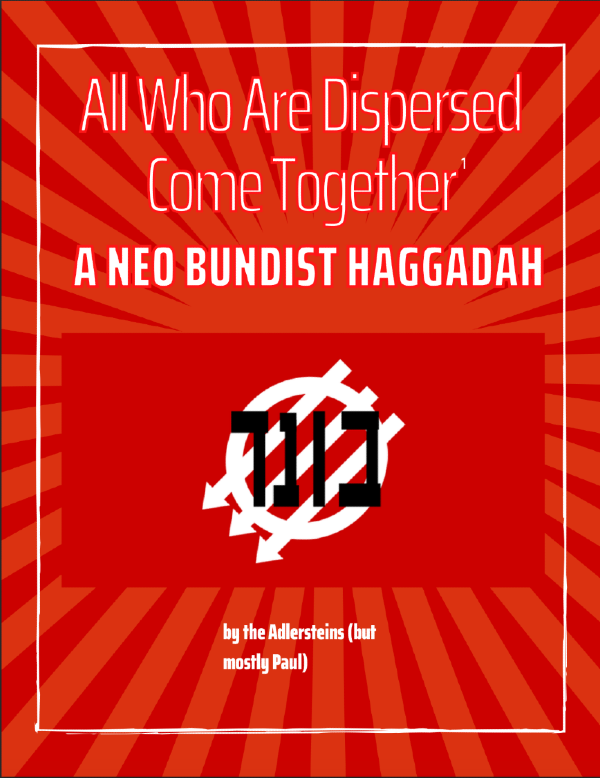
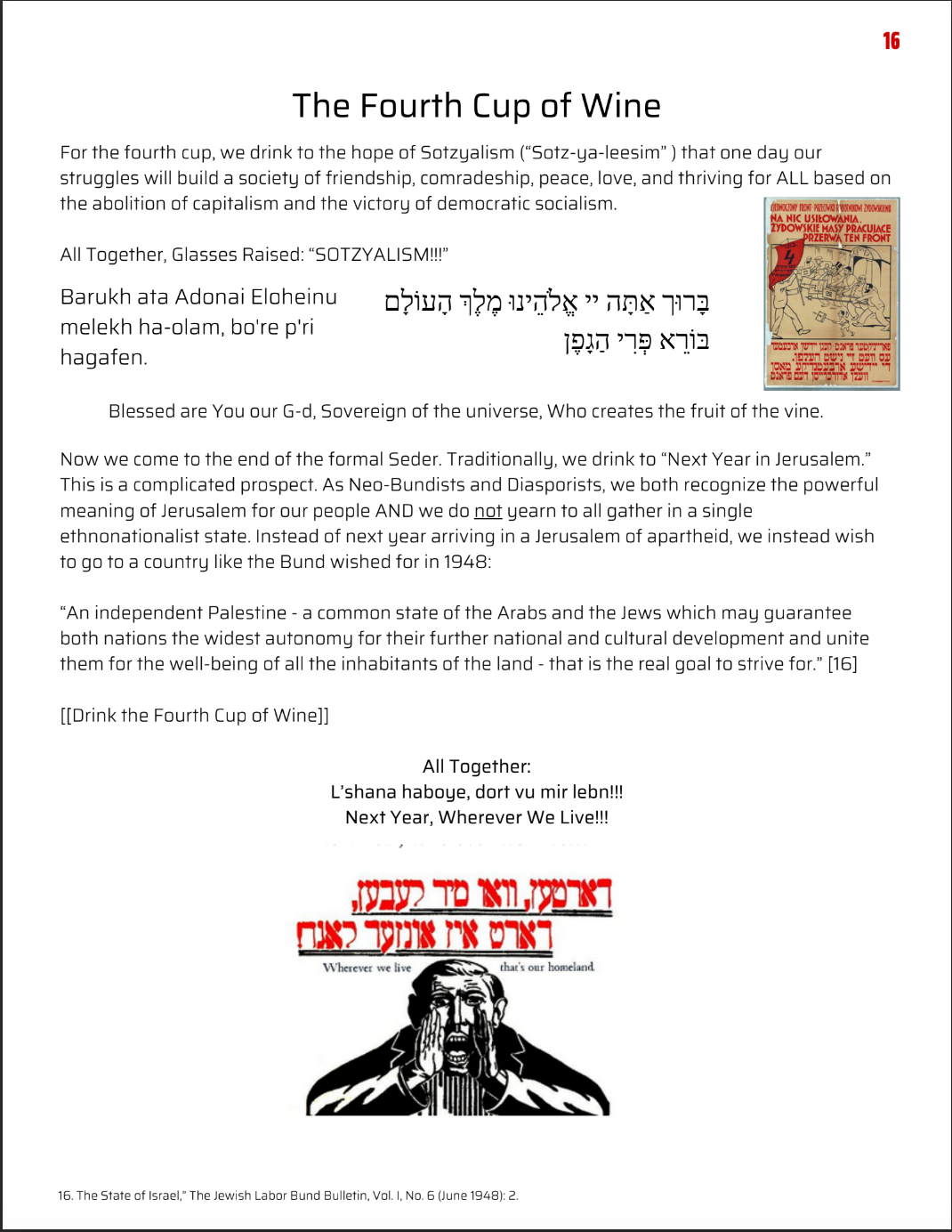
The Neo-Bundist Haggadah incorporates Bundist ideas and slogans throughout the Seder.
Haggadot
A Neo-Bundist Haggadah — Compiled by the Adlersteins (but mostly Paul), this Haggadah incorporates Bundist readings and ideas throughout the Seder.
Freedom for All Seder Haggadah — The Freedom Seder campaign hosted by If Not Now has a digital-friendly Haggadah focused on collective liberation for Jews, Palestinians, and all people.
A Jewdas Haggadah — For a humorous, diasporist Seder.
The Two-Minute Haggadah, a Passover Service for the Impatient — A guide for an extremely abbreviated Seder written by Michael Rubiner.
‘Exodus from Zionism’ Haggadah by Jewish Voice for Peace — Created especially for this year by JVP’s rabbinic council, this Haggadah seeks to “reclaim our holiday of liberation as part of reclaiming Judaism from and building it beyond Zionism.”
Social Justice Haggadot List — A comprehensive list of Haggadot focusing on issues ranging from Palestine to LGBTQ+ liberation, incarcerated people, and more.
Share your Seder with Der Spekter!
How are you, your city, or your local Bundist chapter observing Passover in this year unlike all other years? Did you add something special to the Seder plate, or participate in a local collective action? Der Spekter wants to know. We hope to share your Bundist Passover dispatches from across the Diaspora in our next newsletter.
To be featured, send a few lines and some photos to spekter@derbund.org by Tuesday, April 30.
